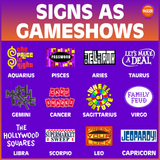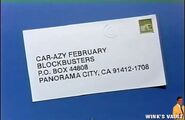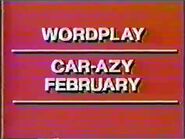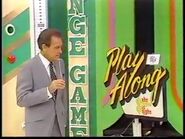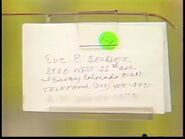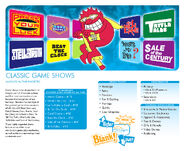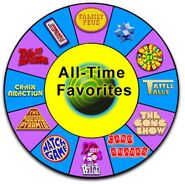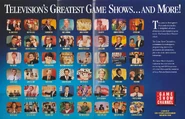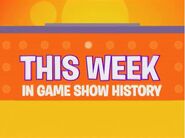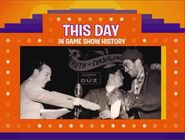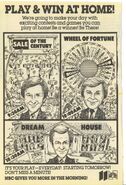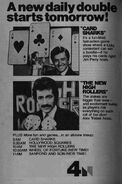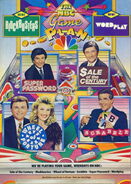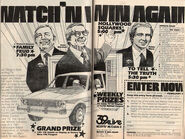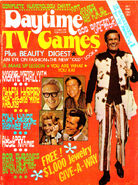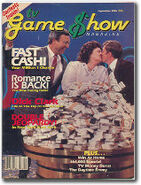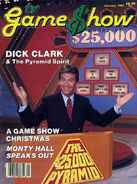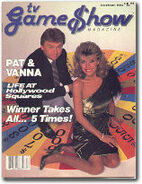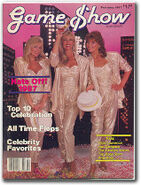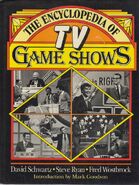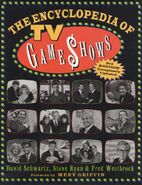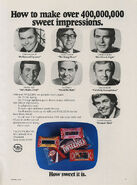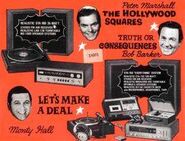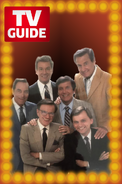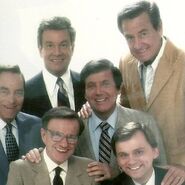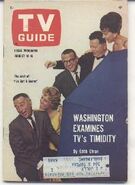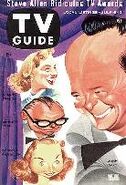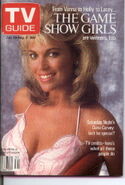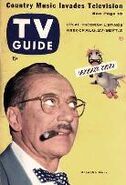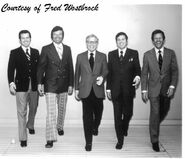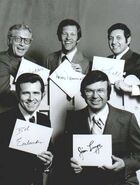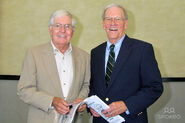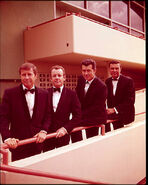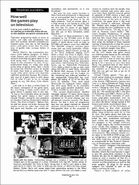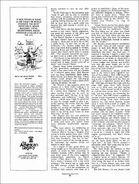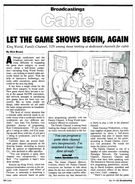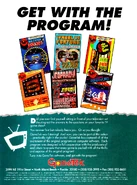A game show is a reality/non-reality television show where amateur contestants regularly compete for a reward.
Matt Ottinger created the basis for this definition on alt.tv.game-shows in 1994. His definition, more or less, continues to apply. Today, some shows fall in the gray area, and may or may not be considered game shows. In particular, several game show fans may count lottery shows, some reality shows, and/or quizbowl shows as game shows.
History[]
The history of game shows dates back to the invention of television as a medium. The first regularly airing television show, according to the Encyclopedia of TV Game Shows, was CBS Television Quiz, which premiered July 2, 1941.
In the 1940s and 1950s, a variety of games appeared on various networks, including ABC, CBS, Dumont, and NBC. The 1950s saw the development of panel shows, such as What's My Line? and To Tell the Truth. However, the biggest development of the 1950s was the creation of the big money show. Shows such as The $64,000 Question and Twenty One were pioneers in that field, giving away more money then ever before imagined. The big money drew high ratings for such shows, and by the late 1950s, many big money shows were on the air.
However, the edifice began to crash, as allegations arose that the big money shows produced by Jack Barry and Dan Enright were scripted, and that contestants were being fed the answers (and in some extreme cases, told exactly how to act). A contestant on Dotto had mailed herself a notebook with all the questions of a future game. On Twenty One, a disgruntled Herb Stempel claimed that he was told to lose to Charles Van Doren. When the allegations proved true, the public lost confidence in game shows, and the genre almost became extinct. However, there were several results of the scandals. First, it became a federal crime to rig a game show. Second, many networks began having Standards and Practices monitor all the action on the stage nonstop, to ensure that no cheating could possibly occur. Finally, many networks established low winnings limits for contestants, the theory being that no producer would want to rig such a low-stakes show.
In the 1960s, many venerable shows aired. The long-running Password premiered in 1961, and Concentration, which had premiered in 1958, ran through the 1960s, only finally leaving NBC daytime in 1973 after a then-record 15 consecutive years of airing. Jeopardy! with Art Fleming premiered in 1964, and has become a staple of television since its revivals in 1978 and then again in 1984 with current host Alex Trebek; with spin-offs including Super Jeopardy! (also hosted by Alex Trebek), Jep! with Bob Bergen, Rock & Roll Jeopardy! with future Survivor host Jeff Probst, and Sports Jeopardy! with sportscaster Dan Patrick.
The 1970s saw game shows being played for significantly higher stakes than before. Previously, players could expect to win a couple hundred dollars on shows like Jeopardy!. The premieres of The $10,000 Pyramid, where $10,000 was up for grabs twice each show, and Match Game, where $5,000 could be won by simply matching a celebrity, caused the inflation of almost all game show payouts. The payouts would increase again in the late 1970s to partially combat the rampant inflation of those years.
The New Price Is Right (now known as The Price Is Right) began airing on September 4, 1972, and holds the record for the longest continuously airing national game show in the United States, now in its 50th season. Wheel of Fortune premiered January 6, 1975, and has been on the air, first-run in some form ever since.
In the 1980s, cable channels began to air game shows. Shows like Everything Goes (1981 Playboy), Starcade (1982 TBS), and Fandango (1983 TNN) were pioneer game shows on cable television. However, the most groundbreaking cable game show was Nickelodeon's Double Dare. After the show's 1986 premiere, Nickelodeon's ratings skyrocketed, and the show was credited with putting the network on the map.
The early 1990s saw the end of daytime network game shows (except for The Price Is Right). ABC's last daytime show was Match Game (1990), while Caesar's Challenge was the last NBC daytime game show. The death of the daytime game show is credited to affiliates preferring syndicated programming, such as talk shows (which were at the apex of their popularity in the mid 90s).
However, the 1990s on cable television was marked by a swarm of game shows, especially ones for children. Following the success of Double Dare, Nickelodeon continued to create new game shows, culminating in acclaimed and well-known series such as Nickelodeon GUTS and Legends of the Hidden Temple. Other channels then followed suit, including PBS, with Where in the World is Carmen Sandiego?, the Family Channel, with Family Challenge and Masters of the Maze. The craze even spread to syndication and networks, with shows such as Secrets of the Cryptkeeper's Haunted House (1996 CBS), Peer Pressure (later known as Pressure 2) (1997 syndication), and Click (1997 syndication) gracing the airwaves.
By the late 1990s, game shows had a greater place in television, especially on cable. The Game Show Network, which launched on December 1, 1994, was airing classic series as well as some original, interactive shows. Shows like Shop 'Til You Drop and Supermarket Sweep became staples for Lifetime (and then PAX). Win Ben Stein's Money was an Emmy award-winning show for Comedy Central. ESPN, which had previously gotten into the game show business with shows such as their own version of Trivial Pursuit, got back into the business with Stump the Schwab and 2 Minute Drill. Even Discovery Channel got into the cable game show business with Cash Cab, the first mobile game show; Spike TV soon followed with Repo Games.
In August 1999, the premiere of Who Wants to Be a Millionaire? became a sensation that revived the big money show. The show's success inspired other networks to produce clone shows, such as Greed , It's Your Chance of a Lifetime (FOX), Winning Lines (CBS), and a revival of Twenty One (NBC). However, in the early 2000s, over-airing of Millionaire led to low ratings and the show's cancellation from ABC. (The show would air in Daytime syndication until cancellation in 2019.)
By the mid 2000s, game shows were in a decline similar to the decline in the mid 1990s. However, the December 2005 premiere of Deal or No Deal saw the return of big money shows to primetime. Deal or No Deal was then followed by a multitude of big money shows, including 1 vs. 100, The Rich List, Show Me the Money, Power of 10, and Million Dollar Password, a revival of the classic game show Password.
Today, game shows show significant promise. Many new shows are premiering in syndication, in primetime, and on Game Show Network. Even if game shows fall out of popularity, it is clear that they will never completely fade away.
Home Viewer Contests[]
Occasionally, certain game shows would hold special contests just for home viewers. Here are some examples:
Car-Azy February[]
On February 1987, all NBC game shows did a special sweepstakes called "Car-Azy February". Each show had a special question or puzzle asked or shown to the home viewers. Correctly answering the questions and/or solving the puzzles won the right to be entered in a drawing for a brand new Isuzu.
Blockbusters[]
For Blockbusters, host Bill Rafferty would read a Gold Run-typed question (which is on a card instead of his secret monitor in his podium).
Wordplay[]
For Wordplay, a Double Definitions puzzle would be shown.
The Price is Right[]
Play Along[]
In the mid-80s, The Price is Right held a special play along contest. On some shows, one of the pricing games that day or one of the Showcase Showdowns would give a lucky home viewer a chance to win the same prize or cash award as the in-studio contestants. If the pricing game was not won or if no money was won at the Showcase Showdown, the home viewer involved won a play along t-shirt.
The Phone Home Game[]
The Phone Home Game was a special pricing game where the contestant played along with a home viewer who played the game via telephone.
Seven products were shown and the phone player gave the price of one of them (from a list), without telling the studio contestant what the product is. In a rare case that this infraction occurs, the turn was dead. In a legal turn, the studio contestant picked the product s/he thought was worth that price. A correct answer won a cash award next to the product, but an incorrect answer won nothing for that turn and both the correct and incorrect products were removed.
All money won in this game was shared between both the home & studio contestants. The maximum grand total was $15,000.
Press Your Luck (Home Player Spin)[]
On three months during the series (20 shows on the first two months & 25 on the third), home viewers got a chance to get in on the fun by playing along with the in-studio contestants. In the weeks prior to the home player month, viewers sent in postcards to the show in hopes to win big bucks or prizes for themselves.
On the months the home player shows took place, during round two, all three contestants playing that day drew postcards from the home viewers who sent them in. One of the spins in that round will become the home player spin, the numbered spin was shown to the home viewers only. When that spin occurred, the player playing that spin read the name of the card he/she drew and whoever it was, that contestant would be spinning for that viewer. Whatever the contestant in control hit on the board was what the home player won; if the contestant hit a Whammy, that player will lose all his/her money as usual (and also be eliminated from the game upon hitting his/her 4th Whammy), but the home viewer still received $500 courtesy of the Whammy and cash amounts plus one spin awarded the home player money only while the contestant got the money and the spin. At the end of the show, the two contestants read off the names of the home players who didn't get to play the lucky spin that day and, as a consolation prize, those home viewers received Whammy T-shirts.
Only once, somebody hit $5,000 + One Spin on a home player spin. It was won by Mrs. Jessie Greene of East Cleveland, Ohio, and that was on the last home player month.[1]
At the end of the final contest, there was a giant Home Sweepstakes Spin, where the board was filled with hundreds of thousands of dollars in cold hard cash (no whammies, prizes or extra spins). All postcards from all periods were mixed into a bowl, and the day's winner drew one of those cards. That player was the winner of the spin, and the champ took one spin at the board, and whatever cash amount was hit was multiplied by the accumulated spin total in round 2. This made possible winnings $100,000 ($5,000 x 20 spins). On that day, Ed Kolzak of Portage, IN, one of the home players who didn't get the lucky spin that day, was chosen to play. The number of spins earned in that day's rounds 2 was 18 spins. Jon Isean, the day's winner hit $2,000 on the board, giving Ed a grand total of $36,000.
The 1-900 Craze[]
In the late 80s and early 90s, the 1-900 phenomenon was all-the-rage and game shows were no exception. These mostly feature an opportunity to play along with their favorite shows on their touch-tone phone at home twenty four hours a day, seven days a week in order to win valuable prizes like U.S. Savings Bonds or a $500 daily cash prize. In addition, the commercials features the host from the said show like: Bob Goen, Alex Trebek, Ray Combs and Monty Hall (for example), promoting the game for people at home to play.
Some of the games were mostly a dollar a minute (while some others add extra for each additional minute) and you must be at least 18 years or older to play. The lists of shows that had their own 1-900 game at the time includes: Wheel of Fortune, Jeopardy!, Let's Make a Deal, Scrabble and Family Feud.
Celebrating 75 Years of the TV Game Show (2016)[]
In 2016, a television network called Buzzr is "Celebrating 75 Years of the TV Game Show" by adding new episodes of favorable classic game shows, additional promotions and special marathons for the network all year long.[2]
Why I Love Game Shows[]
In 2016, the network invited its viewers to upload a photo, video or send a message telling them about your love of game shows where you might even have an opportunity to be featured on the network or on their official Facebook page.
Gallery[]
[]
Game Show Article[]
Trade Ad for Game Show Video Games[]
Contestant's Lounge[]
The TV Ratings System[]
Since the mid-1990s, TV game shows as well as all the other TV genres began their programs by showing lettered ratings for their shows. Like movies and video games, TV letter ratings show certain restrictions of TV shows. And here they are:
References[]
Links[]
Celebrating the 75th Anniversary of the Television Game Show - The Early Years
GSN and Tylenol celebrate the Golden Age of Game Shows
Game Shows Are Back as Viewers Yearn for TV Comfort Food
Game Shows enjoy resurgence in U.S.
Double Jeopardy: Why networks are betting big on game shows again?
Bonus Round stars: 9 celebrities who found their greatest fame on game shows
Tell the truth already: The gratuitous lyrics of 6 game show themes dissected and performed
The Best Game Show Moments of 2015
Shady Game Show Host Moments (courtesy of VH1)
The Most Hated TV Game Show Hosts of All Time
Game Show Hosts Who Are Actually Terrible People
Weirdest and Worst Game Show Gaffes of 2015
The 14 Gayest Moments in Game Show History
See Bob Barker, Pat Sajak and 8 More Game Show Hosts Then and Now!
8 Forgotten Game Shows of the 1960s
'Deal or No Deal' Gets a revival, But should its bevy of 26 models?
16 Game Shows That Need To Return To TV
List of U.S. Game Shows



